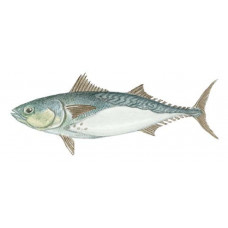Latin name
Auxis thazard
Other names
Bullet mackerel, frigate tuna, leadenall, mackerel tuna; Arabic: deraiga, sadah; French/Danish: auxide; Italian: tombarello; Japanese: hira sóda, soda-gatsuo; Malay/ Indonesian: aya, baculan, kayau, selasih; Portuguese: judeu; Spanish: barrileto negro, melva; Swedish/ Norwegian: auxid; Turkish: gobene, tombile.
Identification
Body shape is similar to A. rochti. The "corset" in the posterior part is narrow, no more than 5 scales wide. The pectoral fins reach the front edge of the scaleless area on the flanks or go behind it. Swim bladder is absent. Color dark greenish-blue above and silvery-white below. It has 15 or more narrow, oblique, dark wavy markings on the non-scaled dorsal part of the body. There are eight dorsal and seven anal fins. It looks more like a tuna than a mackerel, with its more lunate than forked tail. The first and second dorsal fins are separated by a wide gap.
Distribution
Warm waters of all oceans. Frigate mackerel are cosmopolitan in warm waters, although their occurrence in the Atlantic Ocean has been documented. They are subject to periods of abundance and scarcity in certain areas.
Habitat
Epipelagic fish. The frigate mackerel inhabits both coastal waters and the open ocean.
Size
The average frigate mackerel weighs less than 2 pounds and is less than 20 inches long. The world record for all tackle fishing is 3 pounds 12 ounces.
Life history and Behavior
It makes long migrations. It matures at a length of 30-35 cm.
Food and feeding habits
The frigate mackerel feeds on small schooling fish, squid, planktonic crustaceans and larvae.
Reproduction
It spawns in the eastern Pacific year-round. Usually north of the equator from January to April, in the southern Indian Ocean from August to April. Fertility ranges from 200 thousand to almost 1.4 million eggs (the latter at 44.2 cm in length).
| Classification | |
| Phylum | Chordata |
| Class | Actinopterygii |
| Squad | Scombriformes |
| Family | Scombridae |
| Genus | Auxis |
| Species | A. thazard |
| Features | |
| Conservation status | Least Concern |
| Habitat | Pelagic |
| Life span, years | 4 |
| Maximum body weight, kg | 1.7 |
| Maximum length, cm | 65 |
| Sailing speed, m/s | No information |
| Threat to people | Edible |
| Way of eating | Predator |




